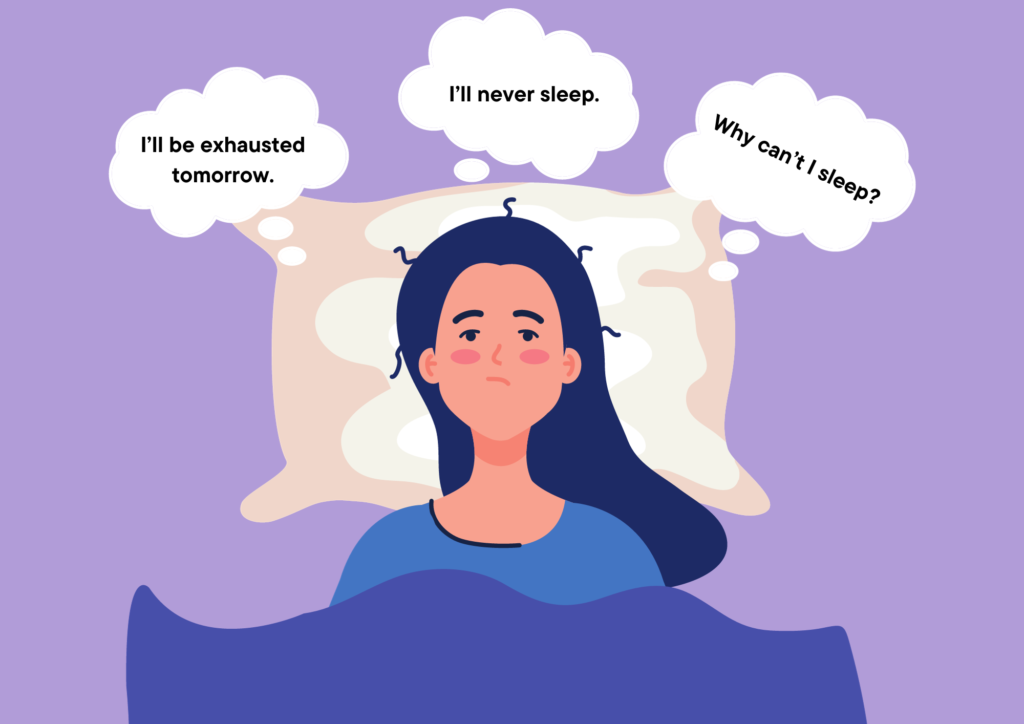
First of all,
Sleep is essential for overall health and well-being, playing a vital role in cognitive function, emotional regulation, and physical health. However, millions of people worldwide struggle with insomnia, a sleep disorder characterized by difficulty falling asleep, staying asleep, or experiencing non-restorative sleep. Insomnia not only leads to daytime fatigue and decreased productivity but also has profound implications for mental health. In this article, we explore the intricate relationship between insomnia and mental health, examining its impact on various aspects of psychological well-being and discussing strategies for management and prevention.
Understanding Insomnia:
Insomnia is a complex disorder influenced by a myriad of factors, including stress, lifestyle choices, underlying medical conditions, and psychiatric disorders. It can manifest in different forms, ranging from transient and short-term insomnia to chronic insomnia lasting for months or even years. Individuals with insomnia often experience persistent feelings of fatigue, irritability, and difficulty concentrating during the day, leading to impaired functioning in various areas of life.
Influence on Mental Well-Being:
The bidirectional relationship between insomnia and mental health is well-established, with each exacerbating the other in a vicious cycle. Chronic insomnia significantly increases the risk of developing mood disorders such as depression and anxiety. Research suggests that individuals with insomnia are up to ten times more likely to develop depression compared to those without sleep disturbances. Similarly, insomnia is a common feature of anxiety disorders, contributing to heightened levels of worry, restlessness, and physiological arousal.
Furthermore, insomnia can exacerbate existing mental health conditions, worsening symptoms and reducing the efficacy of treatment. Sleep deprivation impairs emotional regulation and increases susceptibility to negative emotions, making it harder for individuals with psychiatric disorders to cope with stressors. Additionally, the sleep-wake cycle regulates various neurotransmitters and hormones involved in mood regulation, such as serotonin, dopamine, and cortisol. Disruptions to this cycle due to insomnia can dysregulate these systems, further exacerbating psychiatric symptoms.
Cognitive Impairments:
In addition to its effects on mood, insomnia also impairs cognitive function, leading to difficulties in memory, attention, and decision-making. Sleep plays a crucial role in consolidating memories and facilitating learning processes through mechanisms such as synaptic plasticity and memory replay during REM sleep. Chronic sleep deprivation disrupts these processes, resulting in deficits in both short-term and long-term memory. Moreover, sleep loss compromises executive function, affecting the ability to plan, prioritize tasks, and inhibit impulsive behaviors, which are essential for maintaining optimal mental health.
Physical Health Consequences:
Beyond its impact on mental health, insomnia is also associated with a range of physical health consequences, including cardiovascular disease, diabetes, and immune dysfunction. Sleep deprivation triggers systemic inflammation and disrupts hormonal regulation, contributing to metabolic disturbances and chronic health conditions. Moreover, inadequate sleep compromises the body’s ability to repair and regenerate tissues, increasing the risk of injury and impairing immune function, thereby leaving individuals more susceptible to infections and illness.
Risk Factors and Vulnerable Populations:
Certain factors predispose individuals to insomnia and its associated mental health implications. These include genetic predisposition, environmental stressors, lifestyle factors (e.g., irregular sleep schedules, excessive caffeine intake), and coexisting medical or psychiatric conditions. Additionally, certain demographic groups, such as women, older adults, and individuals with lower socioeconomic status, are disproportionately affected by insomnia due to hormonal fluctuations, age-related changes in sleep architecture, and socioeconomic stressors.
Management and Treatment Approaches:
Effective management of insomnia involves a multimodal approach addressing both the underlying causes and symptoms of the disorder. Behavioral interventions such as cognitive-behavioral therapy for insomnia (CBT-I) have demonstrated efficacy in improving sleep quality and addressing maladaptive sleep habits and beliefs. CBT-I incorporates techniques such as sleep restriction, stimulus control, and relaxation training to promote healthy sleep patterns and alleviate insomnia symptoms.
Pharmacological interventions, including sedative-hypnotic medications, may be prescribed for short-term management of insomnia; however, their long-term use is associated with tolerance, dependence, and rebound insomnia. Therefore, medications are typically reserved for individuals with severe or refractory insomnia who have not responded to non-pharmacological interventions. It is essential to monitor medication use carefully and address any underlying psychiatric or medical conditions contributing to insomnia.
Additionally, lifestyle modifications such as maintaining a consistent sleep schedule, creating a conducive sleep environment, limiting caffeine and alcohol consumption, and incorporating regular exercise into daily routines can promote healthy sleep habits and improve overall sleep quality. Mindfulness-based practices such as meditation and relaxation techniques can also help alleviate stress and promote relaxation, facilitating sleep initiation and maintenance.
In summary:
Insomnia poses significant challenges to mental health, contributing to mood disturbances, cognitive impairments, and physical health consequences. Recognizing the bidirectional relationship between insomnia and mental health is crucial for effective intervention and prevention strategies. By addressing underlying factors contributing to insomnia and adopting healthy sleep habits and coping mechanisms, individuals can mitigate the impact of sleep disturbances on mental well-being and improve overall quality of life. Collaboration between healthcare providers, mental health professionals, and individuals affected by insomnia is essential for implementing holistic approaches to sleep management and promoting optimal mental health outcomes.